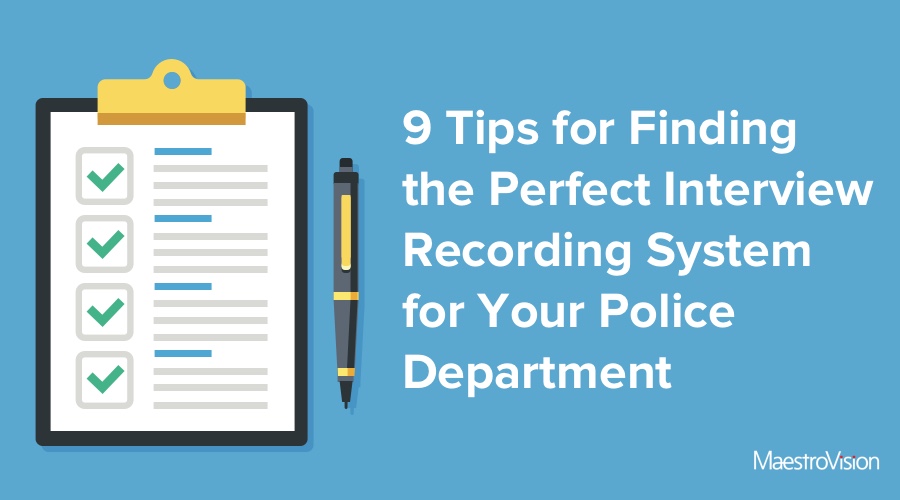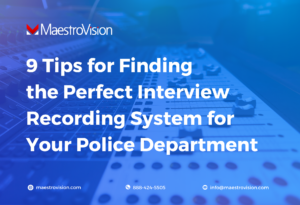Being a company with over 20 years of experience building interview room systems and consulting for tons of police departments, we’ve gained a lot of valuable knowledge on the steps police departments should take when considering an interview room system.
We want to help you! No matter what system you end up with, you should feel empowered to make the correct choice. You don’t need a degree from MIT in order to have an understanding of the technology that can help (or hurt) the quality of your interview recordings.
Here are some tips we’ve compiled for you to make an informed decision on the best interview recording system for your police department.
1. Educate yourself on the differences and pros and cons of IP, USB and HD-SDI cameras.
The majority of interview recording systems on the market today are compatible with IP cameras. However, this has proven to cause issues with audio clarity and synchronization with the video. It’s important to have an acute awareness of your options so you know what to anticipate once you choose your preferred cameras.
2. Don’t skimp on the details. The more information you provide to your vendors, the more tailored the proposed solution will be.
We recommend you send the following information to the vendor you’re considering:
- Images of your interview room(s) and control rooms with square footage (this will give the vendor an idea of the current scope of your interview room), the placement of your furniture, current issues you’re experiencing that’s affecting the feel in the room, sound proofing, etc. They can then propose some solutions to solve your issues.
- The distance between the interview room(s) and the control room. This will help the vendor figure out the installation logistics and cable length requirements.
- The vendor/brand you used for your current system and why it’s not working for you. Is it complicated? Is it missing crucial features? It is time consuming to start, stop and export interviews? Be as specific as possible to ensure you get a demo that is tailored to how the software you’re considering can provide solutions for your issues.
3. Decide what factors are most important to you when choosing the recording software.
For example:
- Do you prefer a picture-in-picture camera layout or side by side?
- Would you like to record a phone, tablet, monitor, lie detector, or another device? Does your supplier offer a system that has the capacity to record these clearly?
- Will you be sharing your recordings with individuals outside of your police department? If you will, you want to make sure that the software you’re considering doesn’t require a software download to replay recordings on individual’s devices external from your department.
4. Check the warranty!
We can’t stress this enough. You want a system with a long-span or lifetime warranty. The day after the warranty is expired, you are in charge of fixing hardware and software issues. Most police departments end up having to complete the search for a new system all over again or put up with an outdated system with broken parts until they have the budget for a new one. Don’t let your police department end up in this predicament.
5. Decide who you want to install the system.
Do you have an IT manager? Would you prefer the vendor install the system themselves? You may be saving costs by having an internal employee install the system but, if issues should arise, you should ensure you have a plan for remote assistance from the vendor.
6. Attend the demo and, if possible, try the software before you buy it.
It should be easy to use and all of your coworkers should feel comfortable and satisfied with it once they try it.
7. Be disaster-proof.
Don’t forget to invest in a backup battery! If power issues should arise, you don’t want your entire system to be down and lose crucial recordings. Make sure you factor this into your quote request. In addition, it may be smart to invest in several computers to operate the software and media library. Relying on one device may cause a system overload and should the computer experience technical issues or shut down, all of your interview room systems will be impacted.
8. Decide whether you want a media library and educate yourself on how on-premise and cloud-based storage works.
Cloud storage gets a bad wrap for being “less secure”, however, this isn’t so. There’s no right or wrong way to handle your storage, it’s about the needs of your department.
9. Be transparent.
So you’ve gotten all of your quotes sitting out in front of you and your favorite vendor’s quote is higher than your budget! What do you do? Our recommendation: don’t settle for less. Go back to your preferred vendor and let them know what’s out of your budget. They just may be able to work with you on getting you your dream system for a lower cost.
Seems like a lot, huh? We know! That’s why our CEO, Claude Turcotte used his audio/visual and broadcasting experience to write a guide that includes all of the information you need to know in order to make an informed decision for your police department.



